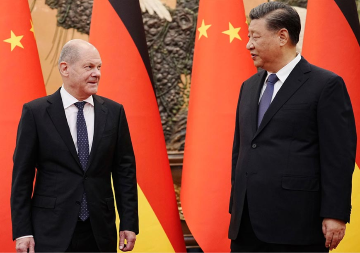
Chinese venture capitalist (VC) funds have been rapidly making their way across the Himalayas and betting on the Indian startup story. In 2018 alone, Indian startups raised around $5.6 bn from various Chinese investors, following from the $3 bn in 2017. In the last 16 years till 2016, the combined investments from China were only valued at around $1.35 bn. Such has been the unprecedented level of investments that Chinese VC funds surpassed those coming in from both the US and Japan in 2018. From what seemed to be unthinkable till almost a decade ago, Chinese money today has offered a fresh lease of life to the perennially cash-crunched Indian startups. It all began with Alibaba’s investments of $500 mn in Snapdeal, $700 mn in Paytm and $150 mn in Zomato in 2015 following which the likes of Fosun Tencent (invested $150 mn in Hike; $400 mn in Ola; $700 mn in Flipkart) and Shunwei Capital ($2 mn in Trubil; $18.2 mn in ShareChat; $13.4 mn in ZestMoney) entered the fray.
However, this trend begs the question of the strategic impact of Chinese influence in India’s startup ecosystem. How does it play out in the larger technology war involving the US and China? Does the regulatory environment allow for unabated financial backing from overseas investors? Can investors tide over the policy challenges and national security concerns raised by the governments?
Basis of the symbiotic relationship
The India-China startup symbiosis is based on a solid foundation: India’s future growth numbers are set to attract investments and the infusion of capital will help early-stage startups to grow faster and reduce the attrition rate amongst them. India has the third highest number of startup incubators and accelerators in the world, after China and the US. Given China’s excess finance and technology expertise, India is the only country that has the market and the strength to absorb China’s excess capacity. China’s strong showing in the financial technology sector has demonstrated the massive potential in a market like India, where smartphone users increased to 481 mn according to 2017 figures, which is an increase of over 11% over the previous year.
Given China’s excess finance and technology expertise, India is the only country that has the market and the strength to absorb China’s excess capacity.
Buoyed by the Walmart-Flipkart deal, Chinese VCs are excited about the prospect of the exit option as they can now look for innovative startups in India and implement the business model in China. As those who have been tracking Chinese investments in India would attest, this strategy has served Chinese VCs well: identifying startup ideas in other geographies that can be replicated in China, and backing them with large capital infusion. This complements the already famous ‘China plus one’ model, which aims to shift operations outside China to benefit from cheaper labour, new markets, and less domestic vulnerability.
Given that the ‘BAT trinity’ (Baidu, Alibaba and Tencent) currently dominates the Chinese startup space, the entry of other Chinese VC funds, including the likes of Morningside Ventures, Fenqile, Hillhouse Capital Group, Plum Ventures etc., would gear them for the long haul as they show increasing interest in India’s digital potential and the hyper-local startup ecosystem for investment opportunities.
For the Indian startups, the Chinese VCs are not merely cash cows but offer crucial domain expertise. Indian startups are engaged in fields where Chinese firms boast expertise: internet-based business, artificial intelligence, big data, robotics and automation, fintech, health, environment, e-learning, agricultural technology, consumer goods and entertainment, including non-addictive gaming. The Alibaba Group Fellowship Programme witnessed 4 Indian startups (Zefo, Healthy Buddha, NowFloats and Grozip) that were selected among the 38 Asian firms who are eligible for funding and knowledge sharing.
Policy challenges and national security concerns
Shashi Tharoor, an Indian parliamentarian, raised suspicions over TikTok’s illegal data transfer to China and aired his concerns on the absence of a strong data protection framework and termed it as a matter of ‘national security.’ The Indian government immediately sought a detailed response from ByteDance, the parent company of TikTok, about the use of its application for the ‘circulation of unlawful content.’ Some researchers had voiced a similar concern after Internet web browser UC Browser was suspected of leaking data to servers in China. Given these episodes, it is imperative that the Indian government devises a coherent set of regulations around data protection, localisation and cross-border data transfer.
Apart from data privacy issues, Chinese investors and companies face pressure from India’s startup lobby group Indiatech, which seeks to ‘protect the interests of Indian companies and investors in the Internet sector.’ From a call for ‘Permanent Establishment’ for foreign firms to push for dual class voting rights structure (DVR) in order to prevent hostile takeovers, the lobby has unequivocally backed the interests of early-stage startups and enhanced promoter rights. However, the recent budget announcement, removing the angel tax provision on overseas profit, has been welcomed in both the startup and investor communities.
Strategic dimensions of the relationship
The impact of Chinese software and hardware play on the technology front cannot be underestimated. There is likely to be an institutional relationship that will take shape with Chinese technology integrated into Indian service industries. How will this impact the use of American software, which have over the years formed the basis of the bilateral relationship? Moreover, in the three services segments where India scores over China — telecommunications, computer and information services, other business services and financial services — its RCA dropped between 2012 and 2016, while that of China’s rose. With India’s comparative advantage taking a hit, China’s services exports totaled $209 bn in 2016, against India’s $162 bn, thanks primarily to its dominant position in segments like transportation, travel, manufacturing services (where physical inputs are supplied by others), maintenance, repair and construction services. So while India is the world’s eighth-largest services exporter, China occupies the fifth position.
There is likely to be an institutional relationship that will take shape with Chinese technology integrated into Indian service industries. How will this impact the use of American software, which have over the years formed the basis of the bilateral relationship?
Also, China will be one of the first countries to register high growth on the back of both manufacturing and services-led export growth. This presents numerous opportunities for Indian startups in the services segment, to leverage the capacity of Chinese companies operating in this field. Moreover, only consulting-as-a-service has been an attractive tertiary industry offering on the part of the US, which has otherwise failed to showcase its clout in other service verticals. The positioning of China as a future hub of services export bodes well for those Indian startups with the strength of Chinese capital.
Lastly, the ability of Chinese VCs to attract sustained interest among Indian startups rests on how they manage to stay within cyber law frameworks. Currently, Chinese VC investments in Africa are bogged down by lack of comprehensive cyber-security laws. Given that the BRI project has a significant digital component, it is imperative that countries that leverage Chinese capital and digital infrastructure have national-level cyber security laws. Given China’s market leadership in the fintech space, Indian startups have an opportunity to capitalise on this development. Although 5G standards are yet to be formalised, China is certainly leading the way. Despite the healthy symbiosis between Chinese capital and Indian startups, one of the complementary challenges of this relationship would be a mindset shift from the popular Silicon Valley culture, which underpins the working of most Indian startups. This entails flat organisational structures, flexible and informal processes, the ethos of “act first, apologise later,” the relentless pursuit of growth, and the “work hard, play hard” climate. Besides betting on valuation and revenue, Indian startups should begin to espouse standards of work ethics and genuine collaborative efforts to drive their growth. How quickly this cultural shift is accounted for would largely impact the success of the Sino-Indian startup ecosystem.
The author is a research intern at ORF New Delhi.
The views expressed above belong to the author(s). ORF research and analyses now available on Telegram! Click here to access our curated content — blogs, longforms and interviews.




 PREV
PREV

